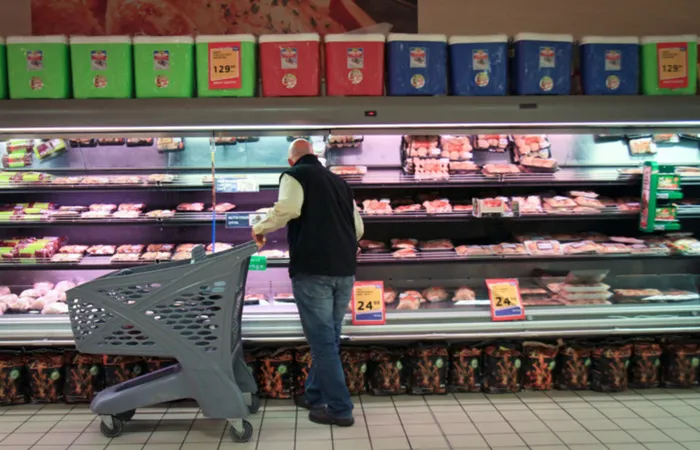Impact of foot-and-mouth disease on meat prices creates concern among consumers
AGRICULTURE

A customer browses the meat and poultry section. Food prices in South Africa rose to 4.4% in April from 3.3% in March, largely driven by meat, specifically beef, due to the outbreak of foot-and-mouth disease.
Image: Bloomberg
The Agricultural Business Chamber (Agbiz) and civil society groups have raised concern about rising prices of food in South Africa, largely driven by meat, specifically beef, due to the outbreak of foot-and-mouth disease.
Data from Statistics South Africa (Stats SA) last week showed that food inflation increased to 4.4% in May from 3.3% in April, despite the headline consumer inflation remaining unchanged at 2.8%.
Wandile Sihlobo, chief economist of Agbiz, acknowledged the acceleration of food price inflation but offered a note of cautious optimism.
Sihlobo also noted that other products remained roughly unchanged while others experienced slowing price inflation.
“Regarding meat, the key issues that have dominated the headlines are the outbreak of avian influenza in Brazil and its potential impact on domestic poultry supplies and prices. The second concern relates to beef supplies following the outbreak of foot-and-mouth disease,” he said.
“The price increases we observe are essentially a continuation of the past few months, mainly due to base effects, the rising domestic demand, and the suppliers' window to pass on some costs they have experienced stemming from higher feed prices over the past couple of months before the recent cooling of maize and soybean prices.”
The Pietermaritzburg Economic Justice and Dignity Group (PMBEJD) conducts a monthly assessment on 44 basic food items as part of the Household Affordability Index.
Mervyn Abrahams, director of the PMBEJD, said they noted that 33 out of the 44 items recorded an increase, with onions up by an alarming 23% when compared to the April index.
“Aside from onions, we also noted that items like potatoes, spinach, butternut, and margarine also recorded increases, which is equally worrying as these are products used on a regular basis in households across the countrym” he said.
Abrahams these were difficult times where most people and families were struggling to make ends meet in what was an illustration of high living costs, meaning that access to food was becoming more difficult on a regular basis.
“Middle-income earners, as well as those in the low-income category, constitute a major portion of the country’s population, and when studies and reports indicate that they are battling to make ends meet, that provides a worrying state of affairs in the country.”
Evashnee Naidu, regional manager for Black Sash in KwaZulu-Natal, noted with concern the upward tick in food price inflation.
Naidu said despite the annual increase in social grants, this continued to be eroded due to food price inflation.
“Those who are on social grants or on lower income thresholds severely bear the brunt of the ongoing increase in food prices. Food insecurity continues to plague South Africa, with seemingly no resolution in sight,” Naidu said.
“Government has to do more to curb ever-increasing food price inflation, and one of the measures could be making the Social Relief of Distress (SRD) grant a permanent form of Basic Income Support to those aged 18-59 years to ensure that individuals and households have some kind of safety net to cushion the blows of increasing prices in South Africa and ensuring that people have some kind of food security.”
Aliya Chikte, project manager at the Alternative Information and Development Centre (AIDC), said more than half the population lives in poverty, leaving the majority without daily access to nutritious food.
“While this has been a persistent issue, the rising cost of healthy protein sources is particularly alarming, especially amid the growing prevalence of non-communicable diseases in the country,” she said.
Chikte also said the continued exclusions from the SRD grant, along with anticipated increases in false exclusions of other social grants, was compounding the crisis and will deepen hunger.
“We are particularly concerned about the planned stringent criteria being applied to the Child Support Grant.”
BUSINESS REPORT